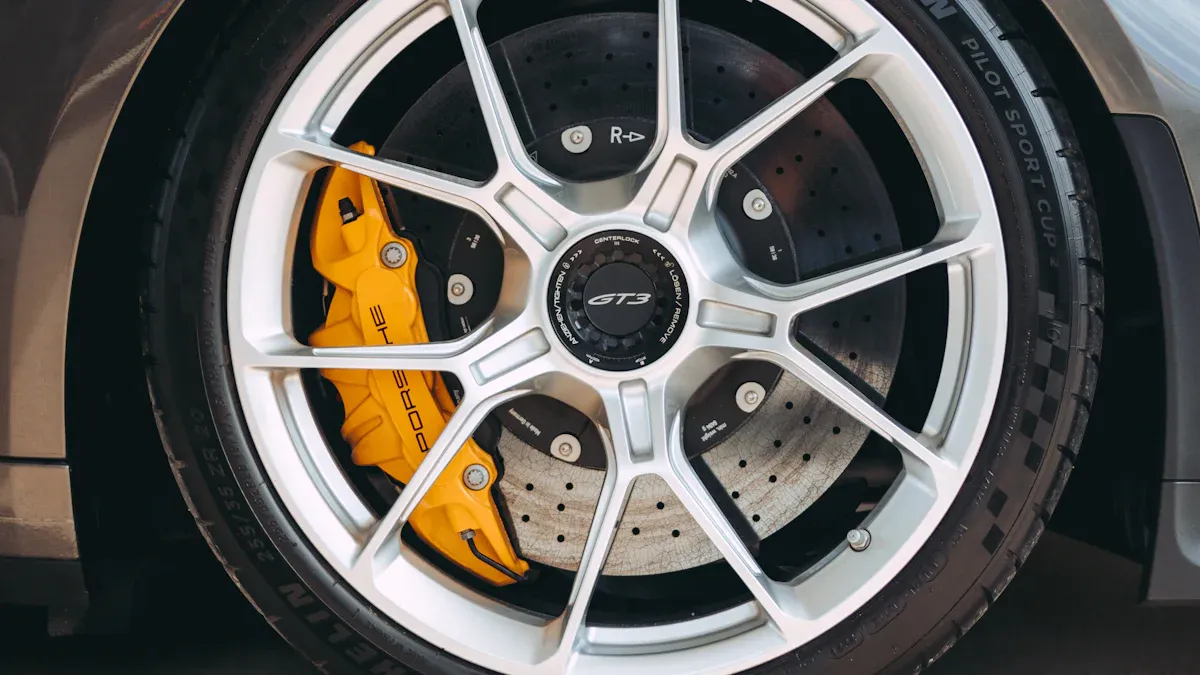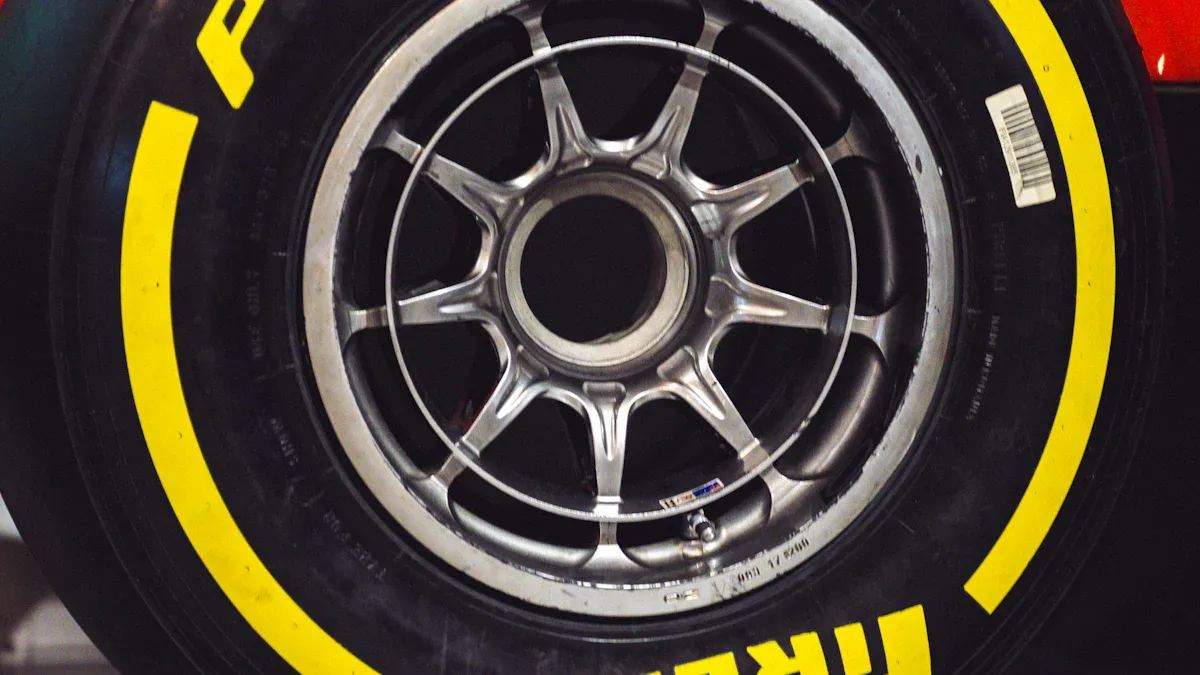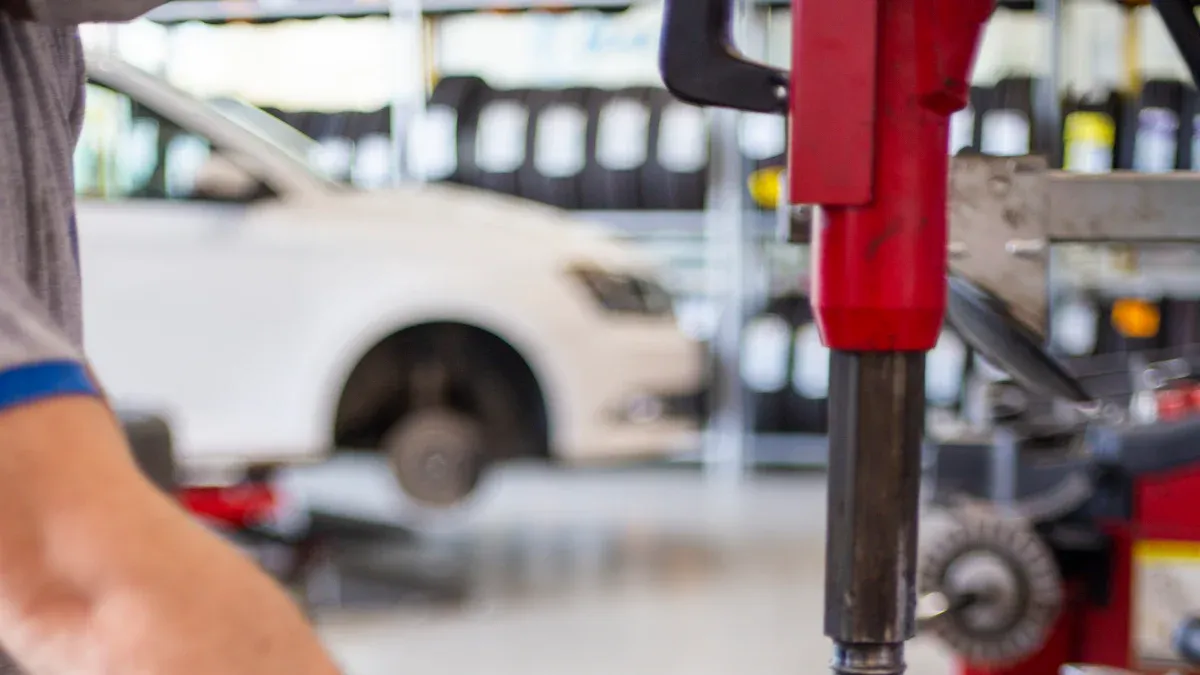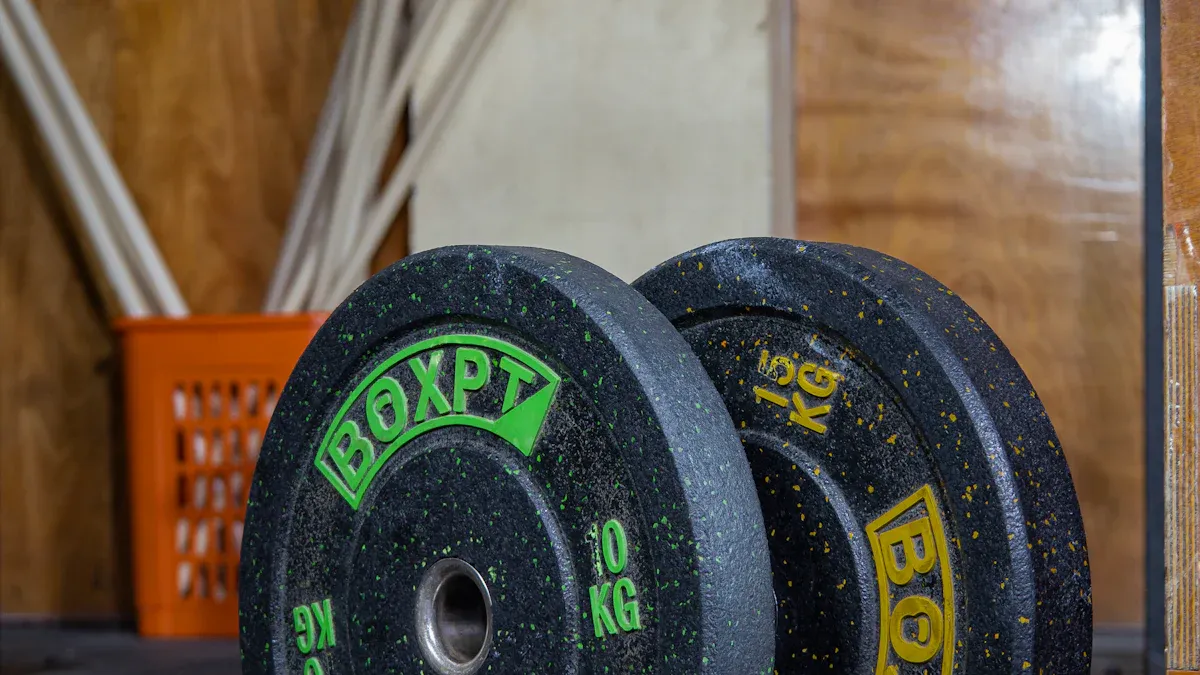

ADHESIVE WHEEL WEIGHTS
home > roll adhesive wheel weights
roll adhesive wheel weights

| art no. | introduction | package |
|---|---|---|
| FSR005-1 | Steel 5g | 5kg / 6kg |
| FSR025-1 | Steel 0.25oz | 11lb / 20lb |
| FSTR025-1 | Steel 0.25oz | 11lb / 20lb |
| FSR050-1 | Steel 0.50oz | 11lb / 20lb |
| FSTR050-1 | Steel 0.50oz | 11lb / 20lb |
| FSR100-1 | Steel 1.00oz | 11lb |

ZINC PLATED

POWDER COATED

CUSTOMIZED COLOR

| art no. | introduction | package |
|---|---|---|
| FSR005-2 | Steel 5g | 5kg / 6kg |
| FSR025-2 | Steel 0.25oz | 11lb / 20lb |
| FSTR025-2 | Steel 0.25oz | 11lb / 20lb |
| FSR050-2 | Steel 0.50oz | 11lb / 20lb |
| FSTR050-2 | Steel 0.50oz | 11lb / 20lb |
| FSR100-2 | Steel 1.00oz | 11lb |

ZINC PLATED

POWDER COATED

CUSTOMIZED COLOR
application of adhesive weights
//
preparatory work

Rotate the tyre and determine the wheel imbalance in both planes. Ensure that the weight, rim and ambient temperature have at least 15°C.
//
clean the mounting area

Use pre-cleaning wipe to clean oil and dust on mounting area, Then wipe with a dry cloth to make sure the wheel surface is dry and clean. Be sure to test the cleaning agent on a small area to ensure it will not damage the wheel’s finish.
//
tear the segments

Once the imbalance point is located and the proper amount of segmented weights have been chosen,according to the properties of the tape of the adhesive wheel weight, use scissors or tear it by hand to cut off the required number of balance weights.
//
peel off the protective backing

Peel off the protective backing without touching the adhesive surface. Be sure to not contaminate the adhesive tape with dirt or oils once the protective backing has been removed. Otherwise, it will affect the adhesion of the tape.
//
set up the weight

Stick the weight and press the weight from the middle towards the outer edges to match the rim perfectly. The pressure should be at least 100 kPa.
//
final check

After applying the weight and ensuring the appropriate pressure has been exerted, it is essential to verify that the weight is securely adhered before reinstalling the assembly on the vehicle. To confirm proper fitment, gently grasp the sides of the weight with your fingers and give it a slight pull. If the weight stays firmly in place without any movement, the setup process has been successfully initiated.
tape options and feature
tapes also available in easy peel tapes
| foam color | liner color/liner material | foam | re-positionable | initial tack | adherence after 24h | resistance to high low temperature | |
| 3M RED | grey | plastic with 3m logo | Acrylic (high temperature resistant) | yes | fair | excellent | excellent |
| NORTON BLUE | black | plastic | acrylic (high temperature resistant) | yes | fair | excellent | excellent |
| LOHMANN | white black | easy release paper | polyethylene | no | excellent | excellent | excellent |
| US WHITE/BLACK | white black | easy release paper | polyethylene | no | excellent | fair | fair/good |
| FST | white black | easy release paper | polyethylene | no | excellent | excellent | fair |
| CHINA BLUE | black | plastic | polyethylene | no | excellent | good | fair/good |

roll adhesive wheel weights: comprehensive guide
What happens when your wheels are unbalanced? Premature tire wear, fuel inefficiency, and even safety hazards. Traditionally, clip-on wheel weights have been the preferred solution, but with the rise of modern alloy wheels and the need for a more aesthetically pleasing and effective alternative, Roller Sticky Wheel Weights have become a better option.
Roller Adhesive Wheel Weights offer a versatile, easy-to-apply solution for balancing wheels without damaging the rim. Fortune will provide a comprehensive overview of roller adhesive wheel weights, and at the end of the day, you’ll know exactly what to look for to ensure optimal wheel balancing and long-term performance.
What is roll adhesive wheel weights?
Roll adhesive wheel weights are wheel balancing counterweights that come in continuous strips that are cut to the desired length for use and adhered as needed. Unlike traditional clip-on wheel weights, they adhere to the inside of the wheel using an adhesive backing for a cleaner look.
roll adhesive wheel weights vs. clip-on wheel weights
Roll-on adhesive wheel weights and clip-on wheel weights serve the same purpose. But they differ in performance, installation, and cost-effectiveness.
Performance and durability differences
Roll adhesive wheel weights offer a safe, non-invasive suture with better long-term durability. Clip-on wheel weights may loosen over time, especially on rough terrain.
Installation process and ease of use
Roll-on Adhesive Wheel Weights: Peel and stick, only a clean surface and proper pressure are required. Easier to install and adjust. Clip-on wheel weights require a specialized tool to hammer them onto the rim, which may damage the rim.
Cost-effectiveness and lifespan
Although the initial cost of roll-on adhesive weights is slightly higher, they have a longer lifespan due to the stronger adhesive. Clip weights have a lower upfront cost, but may need to be replaced more frequently due to loosening or rusting.

benefits of roll adhesive wheel weights
Fortune’s roll adhesive wheel weight blocks use a pressure sensitive adhesive (PSA) that creates immediate adhesion and strengthens over time. Some models include foam backing for added flexibility and enhanced grip on the wheel surface.
Aesthetics
They are fixed to the inside of the wheel and are hidden from view. They keep the vehicle looking neat and tidy.
Reduced risk of damage
Unlike clip-on wheel weights, there is no risk of rim scratches or dents.
Versatility
Roll adhesive wheel weights Blocks are versatile and can be cut to the right size in order to customize them to the specific needs of the vehicle.
Easy to install
The installation process is very simple and can be done with a minimum of tools.
Maintenance roll adhesive wheel weights
Regular Inspections
Regular inspections, after a major accident. Check the weights for signs of wear, damage or loss. If you find any problems, replace them promptly.
Clean the wheel surface
Wheel surfaces must be thoroughly cleaned before use. Dirt, grease and debris will weaken the adhesive and cause it to peel off.
Correct application
Read manufacturer’s instructions carefully when applying. Make sure it sticks evenly and firmly to the rim. Press for a few seconds to ensure a firm bond. If unsure about the bonding process, seek the help of a Fortune professional.
Monitor Tire Pressure
Under-inflated or over-inflated tires can affect wheel balance and cause uneven wear and shedding. Check and adjust tire pressure regularly according to the manufacturer’s recommendations.
Seasonal Precautions
Special care must be taken with wheel counterweight blocks in extreme weather conditions such as heavy rain, snow or ice. Moisture can weaken the adhesive bond and cause it to fall off. Consider inspecting them more frequently during these seasons and reinstalling them if necessary.
why choose roll adhesive wheel weights?
Unbalanced wheels can lead to excessive tire wear, steering vibration and reduced fuel efficiency. Choosing the right roll adhesive wheel weights can optimize wheel balance, improve ride comfort and extend tire life. By considering wheel material compatibility, load-bearing requirements and environmental factors, you can make an informed decision that best suits your vehicle’s needs.
If you haven’t already, consider upgrading to roll adhesive wheel weights today. Each of these modern balancing solutions offers efficiency, reliability and long-term cost savings. Ensure your wheels are perfectly balanced and enjoy a safer, smoother and more fuel-efficient driving experience!
What is the best way to prepare the rim for gluing weights?
Proper rim preparation ensures that adhesive weights adhere effectively and prevent them from falling off during use. Here are the best steps Fortune recommends for preparing your rims for attaching weights.
Clean your rims thoroughly
Use a degreaser or mild soap solution to remove any dirt, grease, or brake dust that may have accumulated on the surface. After cleaning, rinse the rims with water and wipe them completely dry with a lint-free cloth.
Check for damage
Before attaching adhesive weights, check the rims for any damage, such as dents, cracks, or corrosion.
Roughen the surface
To make the weights stick better, slightly roughen the area where you want to attach the weights. You can use sandpaper or a scouring pad to create a slightly abrasive surface. This is to increase the adhesive’s bonding area, making the bond stronger.
Dry the surface
After roughening the surface, make sure the surface is completely dry. Moisture can affect the adhesive’s ability to adhere effectively. Allow the rim to air dry or use a clean cloth to wipe off any residual moisture.
Gluing and Adhesive Weights
Once the rim is clean, inspected, and dry, you can begin applying adhesive weights. Follow the manufacturer’s instructions for placement and pressure to ensure a secure fit.
roll adhesive wheel weights solutions
Unbalanced wheels can lead to excessive tire wear, steering vibration and reduced fuel efficiency. Choosing the right roll adhesive wheel weights can optimize wheel balance, improve ride comfort and extend tire life. By considering wheel material compatibility, load-bearing requirements and environmental factors, you can make an informed decision that best suits your vehicle’s needs.
If you haven’t already, consider upgrading to roll adhesive wheel weights today. Each of these modern balancing solutions offers efficiency, reliability and long-term cost savings. Ensure your wheels are perfectly balanced and enjoy a safer, smoother and more fuel-efficient driving experience!

conclusion
Well-maintained wheels are not only safer, but more pleasant to drive. Regular inspections, proper use, and professional balancing are key to maintaining the integrity of your roll adhesive wheel weights. Taking the time to care for these small but important parts can improve the performance and life of your vehicle, ensuring you get the most out of your investment.
Ball roll adhesive wheel weights are an excellent choice for anyone who wants to maintain the performance and appearance of their vehicle. They are becoming the preferred choice of professionals due to their aesthetics, ease of installation, and effectiveness in achieving proper wheel balance.
Roll-On Wheel Weights FAQ
Disadvantages of roll adhesive wheel weights
Complex Installation: While roll-on sticky weights can be customized, they may require more skill from the user to install correctly. Weights need to be accurately measured and cut.
Visibility: Roll-on sticky weights are also placed on the inside of the wheel, which may not be a problem for most users. This may be a problem if a more traditional look is preferred.
Misuse: If not measured and cut correctly, roll-on weights can cause improper balancing, causing problems such as vibration while in operation.
Should roll adhesive wheel weights be on the inside or outside?
Should wheel weights be placed inside or outside? This can also affect the performance and appearance of the vehicle.
Inside wheel weights: Roll adhesive wheel weights are placed inside the rim. They look neater because they are hidden from view. They are less likely to be damaged by road debris or curbs, extending the life of the weights.
Outside wheel weights: They are easier to install and adjust. They are more accessible to technicians during the tire balancing process. More exposure to the outside world means they are more susceptible to damage and need to be replaced more frequently. Visible weights may affect the overall aesthetic.


